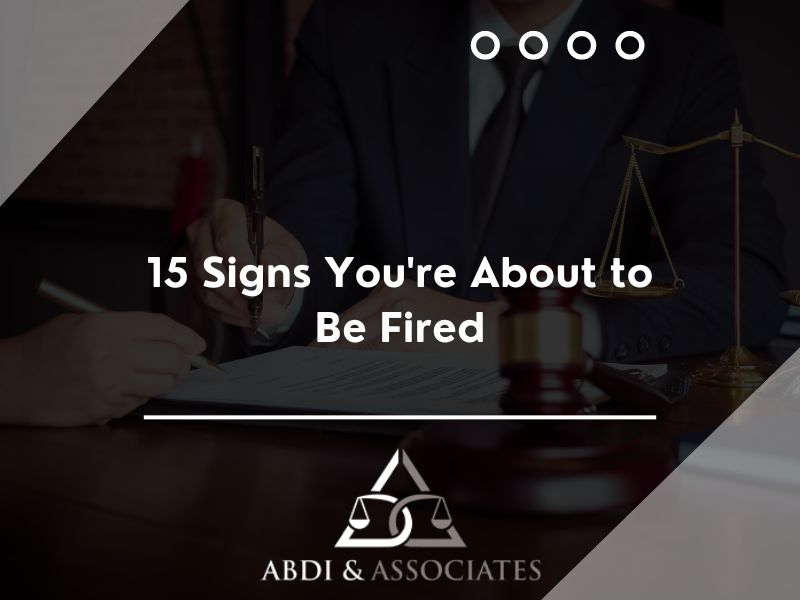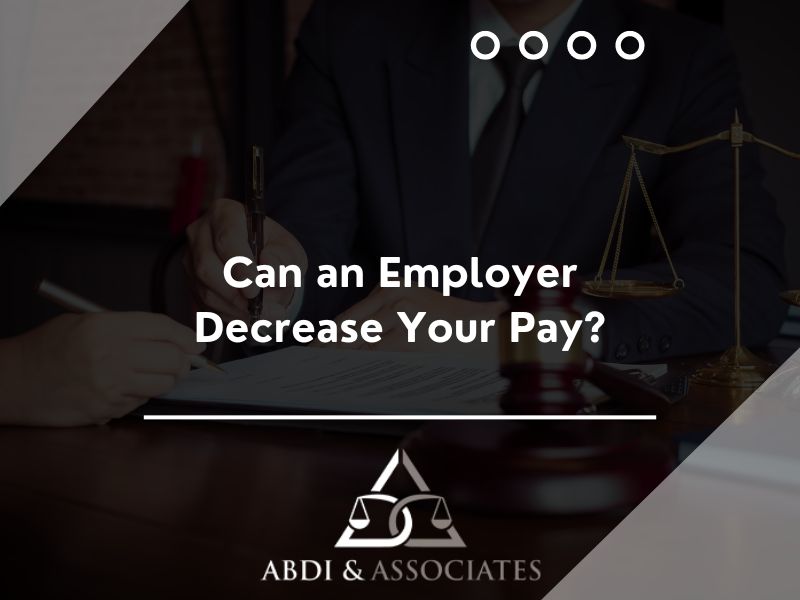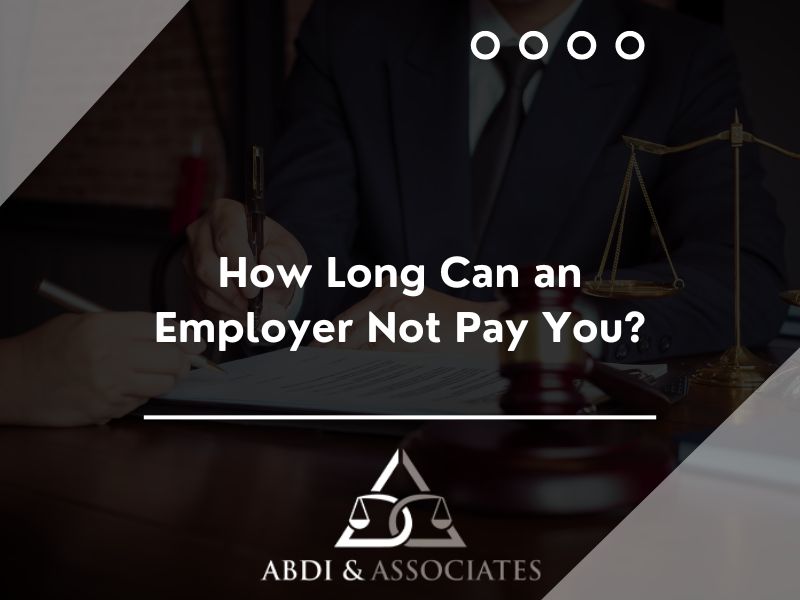
You may be concerned if you have any legal recourse if you recently lost your employment and feel it was unwarranted. Wrongful termination is a severe issue that can strain a person financially, emotionally, and professionally. As you read on, we’ll look at the definition of wrongful termination, deadlines for wrongful termination claims under the law, as well as the crucial role of an attorney, and what you ought to bear in mind to safeguard your entitlements.
Understanding Wrongful Termination
Let’s begin by first establishing what wrongful termination is before we go into the legal procedure for initiating a claim. A worker who has been fired may allege that their dismissal was unlawful because it violated the terms of their contract of employment or applicable law.
An employee who has been fired can pursue a claim for arbitrary dismissal when the employment contract only permits termination for good reason. However, wrongful discharge claims typically surface under the at-will employment standard, where both labor and management have the right to end the relationship at any time. If a dismissed employee can demonstrate an implied contract for permanent employment along with a termination that was made without justification, several jurisdictions allow them to file a lawsuit for wrongful termination pursuant to contract law.
Types of Wrongful Termination
Wrongful dismissal can happen in a variety of ways. These are a few of the most common types of wrongful termination.
- A Workers’ Compensation Claim’s Retaliation
Regrettably, retribution and wrongful termination are sometimes the outcome of a workers’ compensation claim.
In circumstances like this:
- An employee who has an injury at work makes a workers’ compensation claim.
- Shortly after making the claim, the employee is subsequently terminated or laid off.
You might be eligible for a wrongful termination case if you were dismissed after filing for or attempting to get workers’ compensation after being injured on the job.
- Sexual Harassment Complaint Gets Dealt With In Retaliation
Up to 81% of women are said to have encountered sexual harassment at work, and 1 in 5 reports of harassment are filed by men.
Several more employees are allegedly harassed sexually, but many are hesitant to report it for fear of reprisal and being terminated.
Per Title VII of the Civil Rights Act, workers are protected from retaliation. A worker may have a cause for wrongful termination if they report sexual harassment to HR or administration and get fired shortly thereafter.
- Wage and Hour Dispute Termination
Employees have an entitlement to just wages, and they need to be free to express complaints about their pay without fear of reprisal or termination.
Some examples of wage and hour infractions are:
- Not earning the required minimum salary
- Preventing workers from taking breaks for meals or rest
- Not compensating overtime
- Worker misclassification
Wage and hour disputes are governed by the Fair Labor Standards Act (FLSA).
Workers can bring a claim for wrongful termination if they are let go while pursuing overtime without pay or bonuses.
- Discrimination Based On Age
Contrary to popular belief, age discrimination in the workplace is increasingly frequent. Whenever it pertains to disciplinary measures, management may regard younger workers differently than older workers.
Age discrimination may have occurred if a mistake was made and younger employees received a warning while more senior workers were let go.
Workers above the age of 40 are safeguarded against age discrimination in every area of employment, particularly dismissals and layoffs, by the Age Discrimination in Employment Act (ADEA).
Age discrimination and wrongful termination would be committed if a worker over 40 was fired due to their age.
- Discrimination based on race
Workers cannot be subjected to discrimination on the basis of race or color of skin, according to state and federal laws.
Discrimination based on race can take the following forms:
- Making racial-based employment, firing, and promotion choices.
- Excluding people of one race from particular positions.
- Racial stereotypes towards staff members.
An atmosphere that is toxic and unfriendly can be brought about by racial prejudice. It may constitute wrongful termination when workers are dismissed for complaining about discrimination or experiencing discrimination on the basis of race.
- Retaliation against Whistleblowers
Workers have the right to disclose illegal behavior if their employer is involved in it. Additionally, they are shielded from being fired in reprisal for alerting the authorities about these operations.
From safety breaches to fraud, there are many illicit actions. Worker wrongful termination may occur if they are dismissed for reporting unlawful conduct.
- Family and Medical Leave Act (FMLA) violations
Workers who require to take time out of work due to ailments, caring for a loved one, or taking duties with a new infant are protected under the FMLA. As a result of requesting time off, workers are not subject to reprisals from their employers when they resume work under this law. You may be able to file a claim for wrongful termination if you were dismissed as a result of obtaining a family or medical leave.
Statute of Limitations
The statute of limitations, to lay it in simple terms, is the amount of time a person has to file a legal action, including one for wrongful termination. Plaintiffs typically have a period of one to three years from the day of their termination to launch a legal action against their previous employer, however, this varies by state and depending on the type of claims. To make sure you avoid forfeiting your window of opportunity, it’s crucial to review the exact limitations in the state you’re from.
Statute of Limitations Exemptions
The statute of limitations has several exceptions that might give you more time to file an action for wrongful termination. The statute of limitations could be stretched out for instance, if the employer hid unlawful grounds for the termination. The statute of limitations can be further prolonged if the worker learned about the basis for their termination only afterward.
Role Of A Wrongful Termination Attorney
It’s crucial to know your legal alternatives and seek the counsel of a skilled employment attorney if you feel that your termination was unfair.
Knowledge Of Labor Legislation
State and federal employment laws are a specialty of employment lawyers. They can inform you of your legal options, clarify your legal entitlements, and guide you in comprehending the legislation that’s particularly applicable to your case. Additionally, they can guarantee that your case is properly filed and assist you in navigating the convoluted legal process.
Collecting Evidence
The collection of evidence is one of the most crucial components of a wrongful termination lawsuit. Your claim will need to be supported by proof, like performance reports, emails, and witness testimonies, which an employment attorney can aid you in finding. They can also help gather and evaluate the proof to create a compelling argument.
Negotiating Settlements
In rare circumstances, reaching an agreement with your previous employer outside of court may be achievable. You can negotiate a reasonable settlement with the assistance of an employment lawyer, which will cover your lost pay, emotional suffering, and other damages. Additionally, they can guarantee that any settlement agreement safeguards your legal entitlements and is in your best interests.
You’ll Be Represented in Court
An employment attorney will advocate for you and fight for you if your case gets to court. They may defend you before the court or jury, provide evidence, and cross-examine witnesses. They could also help you in comprehending the legal system and in getting ready for court appearances.
Hire Abdi & Associates As Your Legal Representative Right Now
The repercussions of wrongful termination can be substantial, but you can get through the legal process and safeguard your liberties with the assistance of an employment attorney with years of experience. They can aid in obtaining evidence, negotiate settlements, and defend you in court. They also have a deep understanding of employment legislation. It’s crucial to obtain legal counsel if you think your termination was unfair for the purpose of better understanding your legal actions and safeguarding your interests.
We at ABDI & Associates think it’s important to hear from everyone who enters our office. When you collaborate with us, we consider you as our family. Call us at (888) 772-2529 or fill out our online form to schedule an obligation-free consultation to discuss your situation with a Los Angeles wrongful termination lawyer.
Navigation
Related Posts


Can an Employer Decrease Your Pay?
Continue Reading
